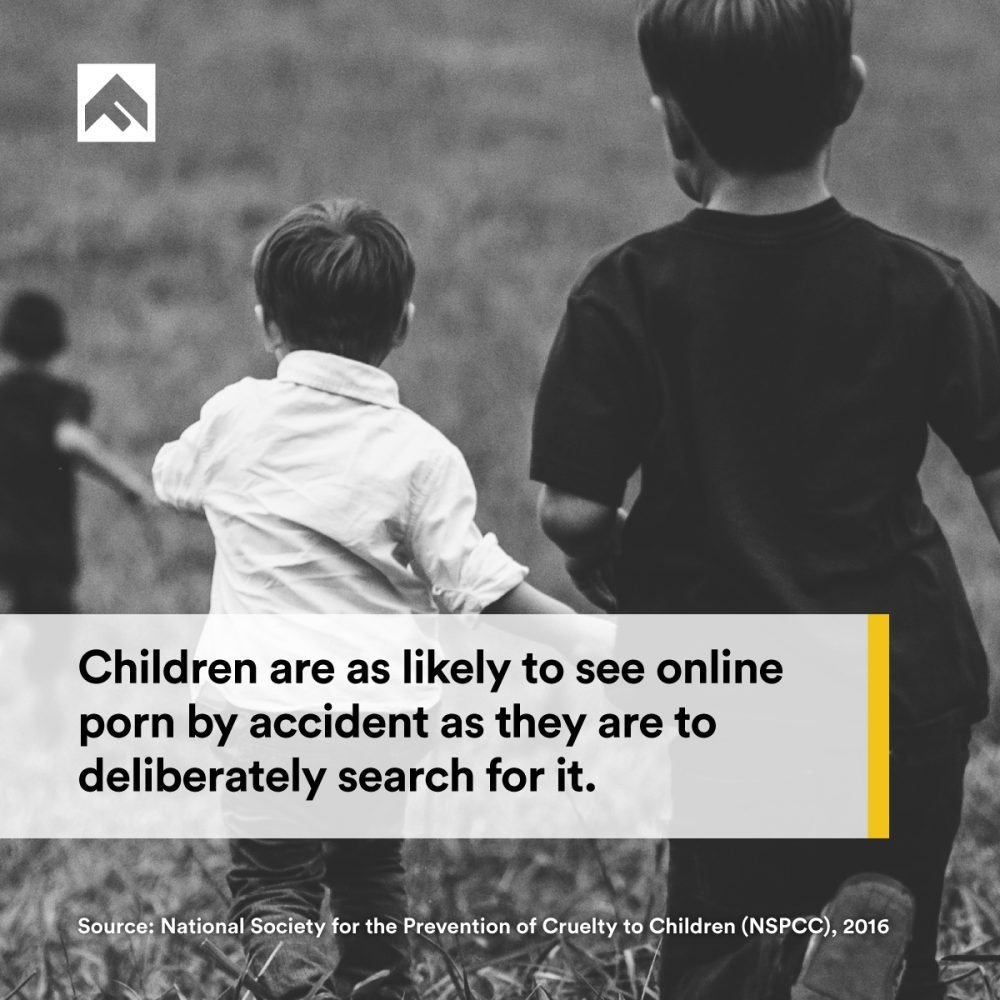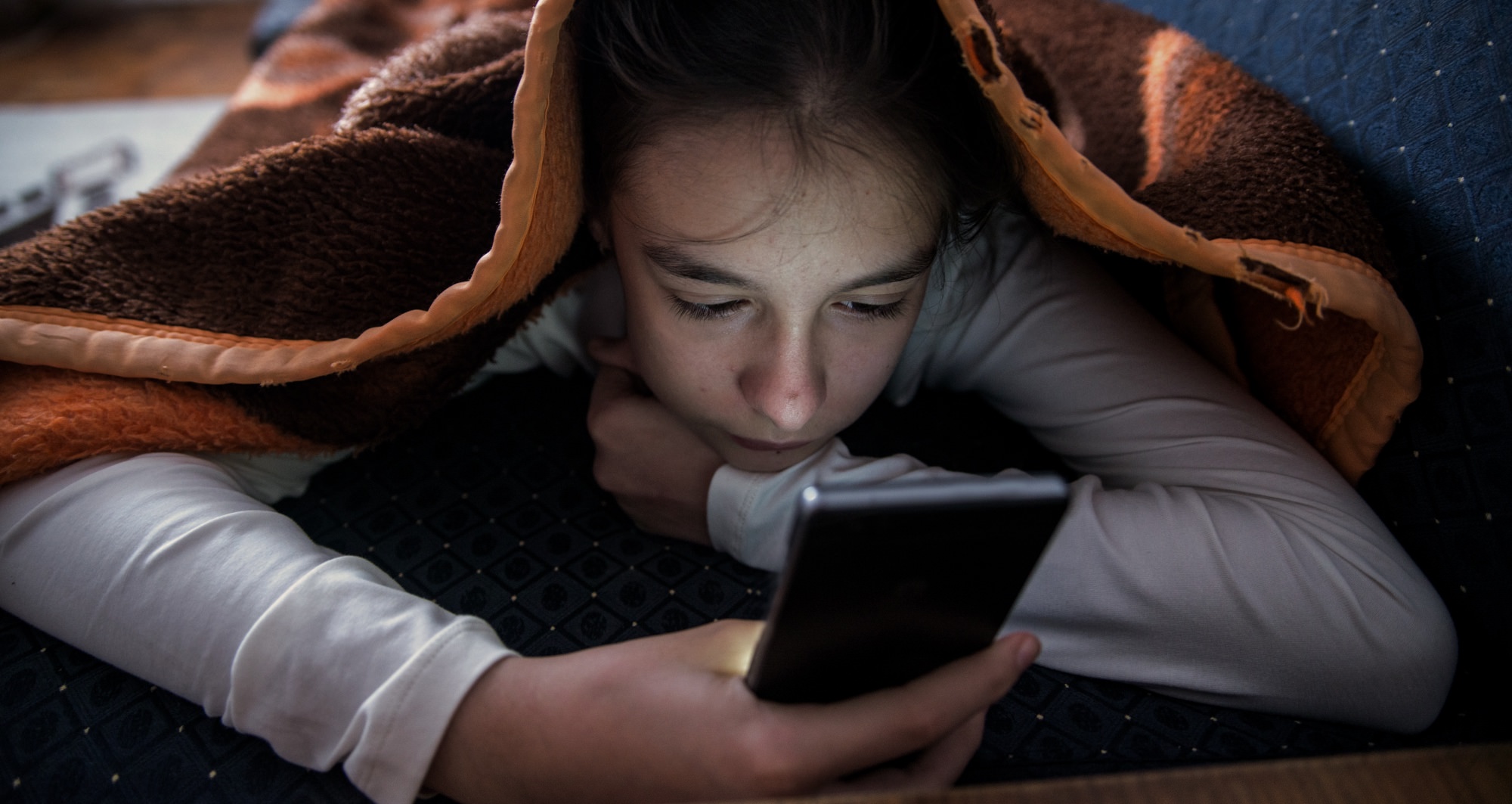Kids as young as 11 have admitted struggling with to online pornography, according to recent reports.
According to this article, Childline—a free and confidential, UK-based service for kids under the age of 19—has received up to 2,000 calls from minors after viewing “graphic” and “disturbing” online pornography. The NSPCC—a leading children’s charity whose mission is to end child abuse in the UK—reported in DailyMail.com earlier this year that 1 in 10 of the kids who received psychological help after viewing pornography were 11 years of age or younger, and 63% were aged 12 to 15.
What’s worse? Many of the minors who sought out help weren’t seeking out pornography when they first came across it—it found them.
Accidental first exposures are common
A lack of age verification on pornographic sites has left adolescents at risk of exposure, especially at a time where porn pops-up in common places like emails and online advertisements.
The NSPCC’s research on the subject found that 46% of minors who said they had watched porn were first exposed to it by accident—often as a result of graphic pop-up images appearing on their screens or through links sent on social media and via email. Not cool—we often receive messages from Fighters whose years-long struggle with porn started from a random pop-up or email.
Where is the age verification?
A lack of age verification on pornographic sites has also left kids susceptible to graphic adult-content. Without proper age verification processes, kids can easily get exposed to explicit content when clicking on what they think is an innocent link.
In a recent conference in London, instituting required age verification methods—such as sending a text to check the phone contract holder was over 18 or asking for credit card, age and address—was discussed as a possible solution to under-18s being exposed.
Laws were supposed to be set in place to make explicit pop-ups illegal by fining porn giants who fail to check users’ ages up to £250,000 but it was postponed until “later in the year” after experts warned that it could provide adult sites with more information about its users.
Real stories of early exposure
The lack of an age-verification process continues to leave kids exposed to porn—sometimes even leading to an addiction to pornography. One 13-year-old boy told Childline, “I have been bullied into watching pornographic videos by people at school, which makes me feel sick. One showed a woman being raped, it was so upsetting.”
Another girl who was only 11 years old claimed to have become addicted to pornography after being sent a link to a website, which she opened without realizing what it was. She told the help service, “I am really ashamed and now I am getting emails from tons of porno sites. I am so scared my mum is going to find out.”
How is it that the new “norm” is the upcoming generation being pressured to look at and seek out the most explicit content imaginable?
The aftereffects of early porn exposure
The 2,000 school-aged kids who contacted Childline’s advice service claimed to be left “disturbed” and “insecure” after watching pornography online.
One teenage girl had reported that she felt “really insecure” since watching pornography with her boyfriend, stating, “All the girls in porn films were so pretty and perfect, so it’s left me feeling fat and ugly,” she said. “I am really down and depressed.” This is a common theme in pornography, leaving partners feeling inadequate and insecure.
At a time where self-confidence is already so delicate, pornography can really be the breaking point, especially for someone who hasn’t had very many real-life sexual experiences to understand that fantasy is not reality.
Fighting back with education
“When it comes to talking about pornography,” Tony Stower, the head of the NSPCC, explains, “it’s important [for parents] to emphasize that these videos don’t give a realistic portrayal of sex, healthy relationships, consent or body image.” We couldn’t agree more.
It’s important for anyone who needs to, to feel comfortable talking about sex with a parent or guardian that they trust, or from a trusted and accurate source of information. Too often, teens turn to porn to answer their common and curious questions about sex, which leaves them with a harmful view of love and relationships.
What can you do?
The fact is, pornography is more accessible, available, affordable, and anonymous than ever, and whether someone intentionally seeks for it themselves or they are the victim of a surprise pop-up ad, the chances of early exposed is likely. But don’t lose hope—we’ve got your back.
Parents can help equip their child by peppering in some casual (and informative) conversations about sex with their kids. And if you’re a student, step up and share the facts with your fellow classmates.

Your Support Matters Now More Than Ever
Most kids today are exposed to porn by the age of 12. By the time they’re teenagers, 75% of boys and 70% of girls have already viewed itRobb, M.B., & Mann, S. (2023). Teens and pornography. San Francisco, CA: Common Sense.Copy —often before they’ve had a single healthy conversation about it.
Even more concerning: over half of boys and nearly 40% of girls believe porn is a realistic depiction of sexMartellozzo, E., Monaghan, A., Adler, J. R., Davidson, J., Leyva, R., & Horvath, M. A. H. (2016). “I wasn’t sure it was normal to watch it”: A quantitative and qualitative examination of the impact of online pornography on the values, attitudes, beliefs and behaviours of children and young people. Middlesex University, NSPCC, & Office of the Children’s Commissioner.Copy . And among teens who have seen porn, more than 79% of teens use it to learn how to have sexRobb, M.B., & Mann, S. (2023). Teens and pornography. San Francisco, CA: Common Sense.Copy . That means millions of young people are getting sex ed from violent, degrading content, which becomes their baseline understanding of intimacy. Out of the most popular porn, 33%-88% of videos contain physical aggression and nonconsensual violence-related themesFritz, N., Malic, V., Paul, B., & Zhou, Y. (2020). A descriptive analysis of the types, targets, and relative frequency of aggression in mainstream pornography. Archives of Sexual Behavior, 49(8), 3041-3053. doi:10.1007/s10508-020-01773-0Copy Bridges et al., 2010, “Aggression and Sexual Behavior in Best-Selling Pornography Videos: A Content Analysis,” Violence Against Women.Copy .
From increasing rates of loneliness, depression, and self-doubt, to distorted views of sex, reduced relationship satisfaction, and riskier sexual behavior among teens, porn is impacting individuals, relationships, and society worldwideFight the New Drug. (2024, May). Get the Facts (Series of web articles). Fight the New Drug.Copy .
This is why Fight the New Drug exists—but we can’t do it without you.
Your donation directly fuels the creation of new educational resources, including our awareness-raising videos, podcasts, research-driven articles, engaging school presentations, and digital tools that reach youth where they are: online and in school. It equips individuals, parents, educators, and youth with trustworthy resources to start the conversation.
Will you join us? We’re grateful for whatever you can give—but a recurring donation makes the biggest difference. Every dollar directly supports our vital work, and every individual we reach decreases sexual exploitation. Let’s fight for real love:




